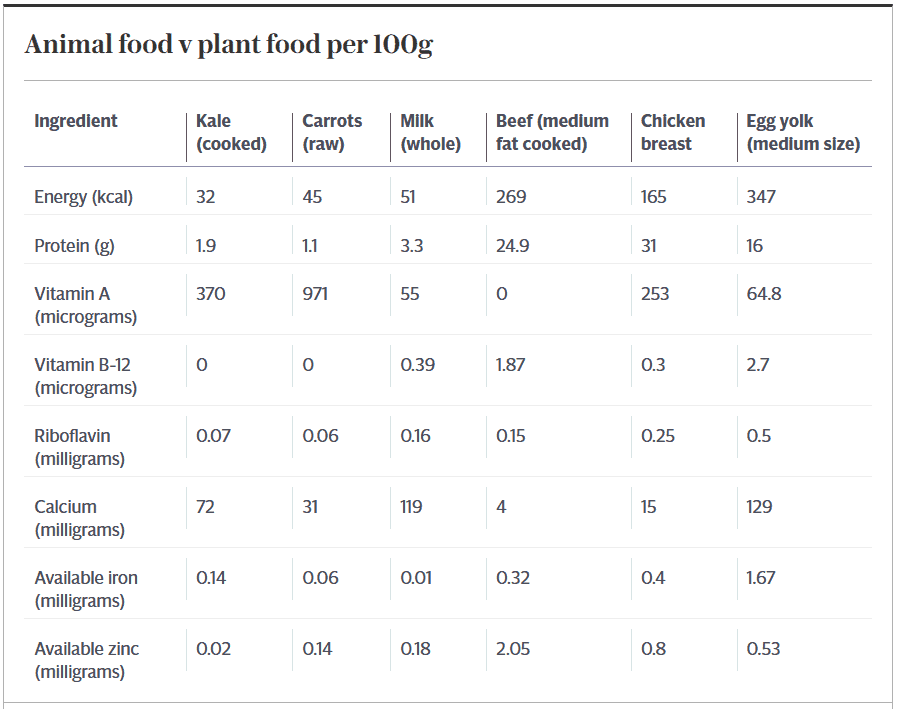As the rates of obesity, heart disease, and type 2 diabetes continue to rise, the question of What should I eat? has become critically important in the 21st century, emphasizing the role of food in our health. It is widely recognized that food can significantly impact our well-being, enhance our quality of life, and aid in the process of healing and recovery from illnesses.
Numerous scientific studies support the notion that food acts as medicine. To enhance your current and future health, minimize the risk of chronic diseases, and add healthy years to your life, it is crucial to prioritize the food choices you make.
A recent extensive analysis conducted by a scientific advisory committee for the UN’s Food and Agriculture Organization (FAO) examined over 500 scientific papers to assess the benefits and risks associated with animal foods.
Their findings highlighted the significance of meat, eggs, and milk as valuable sources of essential nutrients, including protein, essential fatty acids, iron, calcium, zinc, selenium, vitamin B12, and choline. Animal foods also contain beneficial compounds such as carnitine, creatine, and taurine, which play essential roles in health and development.
The experts stressed that certain nutrients, which are vital for overall health, are not easily obtained from plant-based foods. Additionally, they highlighted the importance of animal foods, particularly during old age, for meeting specific nutritional needs.
Now, this raises a valid question about individuals who follow a 100% plant-based diet. Do they face an increased risk of chronic diseases, such as heart disease, blood vessel disease, stroke, or heart attacks?
To answer these questions, a recent study featured in the European Heart Journal aimed to examine the impact of vegetarian or vegan diets compared to omnivorous diets on various cholesterol measures. The study analyzed 30 randomized trials involving a total of 2,372 participants. These trials were published between 1982 and 2022 and focused on quantifying the effects of different diets on total cholesterol, low-density lipoprotein cholesterol (LDL cholesterol, commonly referred to as ‘bad’ cholesterol), triglycerides (a type of fat or ‘lipid’ found in the blood), and apolipoprotein B (apoB – a protein that aids in transporting fat and cholesterol in the bloodstream and serves as a reliable indicator of the overall quantity of unhealthy fats and cholesterol in the body).
While previous meta-analyses have explored this topic, none have been published since 2017, and none have delved into the influence of factors such as continent, age, body mass index, and health status. Furthermore, no prior analyses have specifically examined the impact of different diets on apoB concentrations. Therefore, this new study fills the existing knowledge gaps by considering a comprehensive range of factors and providing up-to-date insights into the effects of vegetarian or vegan diets on cholesterol markers, including apoB.
According to Professor Ruth Frikke-Schmidt, the Chief Physician at Rigshospitalet in Copenhagen, Denmark, a recent study conducted in collaboration with medical student Ms. Caroline Amalie Koch and Dr. Emilie Westerlin Kjeldsen from the same institution has shown promising results for vegetarian and vegan diets in reducing the levels of artery-clogging lipoproteins, specifically apolipoprotein B. The findings indicate a 14% reduction in these lipoproteins, which is equivalent to about one-third of the effect observed with cholesterol-lowering medications like statins. In practical terms, adopting a plant-based diet for a period of five years could lead to a 7% decrease in the risk of cardiovascular disease.
It’s important to note that while statin treatment remains superior in reducing fats and cholesterol levels, this study suggests that plant-based diets can play a complementary role. Combining statins with a plant-based diet is likely to have a synergistic effect, potentially leading to even greater benefits.
The potential for reducing the risk of cardiovascular disease caused by blocked arteries is significant, especially if individuals embrace vegetarian or vegan diets from an early age. Encouragingly, the study’s results were consistent across continents, age groups, different body mass index ranges, and various health conditions. This suggests that the benefits of such diets apply broadly to diverse populations.
In the 30 studies, participants were randomly assigned to either adopt a vegetarian or vegan diet or continue with their omnivorous diet, which includes meat and dairy products. The duration of these dietary interventions varied from ten days to five years, with an average duration of 29 weeks.
The findings revealed that individuals adhering to a plant-based diet exhibited significant improvements in their cholesterol profiles when compared to those consuming an omnivorous diet. On average, participants following a plant-based diet experienced a 7% reduction in total cholesterol levels from the baseline measurements recorded at the beginning of the studies. Moreover, there was a notable 10% reduction in LDL cholesterol levels, often referred to as “bad” cholesterol, and a 14% reduction in apoB levels, which are associated with cardiovascular health.
“We saw significant effects from both vegetarian and vegan diets and people ranging from a normal weight to obese,” adds Professor Ruth Frikke-Schmidt.
Plant-Based Diets: A Path to Environmental Sustainability and Cardiovascular Health
Cardiovascular disease (CVD) is responsible for the highest number of deaths worldwide, claiming the lives of over 18 million individuals annually. It poses a significant health challenge that needs to be addressed urgently. The United Nations’ Sustainable Development Agenda has set a goal to reduce premature deaths caused by non-communicable diseases like CVD by one-third before 2030. Moreover, there is growing awareness about the impact of our dietary choices on the environment.
Recent comprehensive evaluations have also highlighted the potential benefits of transitioning to plant-based diets in high-income countries. By making this shift, we can significantly decrease net greenhouse gas emissions by approximately 35% to 49%.
“Our study provides robust evidence that plant-based diets are good for our health for people of different sizes, ages, and health conditions,” remarks Prof. Frikke-Schmidt.
“Furthermore, populations globally are aging and, as a consequence, the cost of treating age-related diseases such as atherosclerotic cardiovascular disease is increasing. Plant-based diets are key instruments for changing food production to more environmentally sustainable forms, while at the same time reducing the burden of cardiovascular disease. We should be eating a varied, plant-rich diet, not too much, and quenching our thirst with water.”
The meta-analysis conducted by Professor Frikke-Schmidt and her colleagues was unable to evaluate the potential advantages of diets directly comparing fish-based diets to omnivorous diets. This limitation was primarily attributed to the absence of relevant studies addressing this specific comparison within the scientific literature.
“However, the Mediterranean diet is rich in plant-based foods and fish and is well-established as being beneficial in dietary guidelines,” she adds.
The findings “add to the body of evidence supporting favorable effects of healthy vegan and vegetarian dietary patterns on circulating levels of LDL-C [LDL cholesterol] and atherogenic lipoproteins, which would be expected to reduce ASCVD [atherosclerotic CVD] risk,” comment Professor Kevin Maki, of Indiana University School of Public Health Bloomington, and Midwest Biomedical Research and Professor Carol Kirkpatrick, of Midwest Biomedical Research and Idaho State University, USA, who were not involved in the research, who were not involved in the study.
“While it is not necessary to entirely omit foods such as meat, poultry, and fish/seafood to follow a recommended dietary pattern, reducing consumption of such foods is a reasonable option for those who prefer to do so.”
One notable strength of this study is that it stands as the most comprehensive systematic review conducted on this particular topic to date, as far as the authors are aware. Notably, it is also the first review to incorporate apoB as a variable. However, it is important to acknowledge certain limitations associated with the study. Firstly, the individual randomized controlled trials included in the review were relatively small in scale. Moreover, the duration of participants’ dietary interventions in many of these studies was less than a year. Additionally, due to the nature of the interventions, it was not possible to implement a blind protocol, which may have influenced participants’ behaviors impacting cholesterol and fat levels.
Both the researchers and the authors of the editorial emphasize the necessity for further investigations involving larger sample sizes and longer intervention durations. Moreover, future studies should consider incorporating additional biomarkers, such as those related to inflammation and insulin resistance, to provide a more comprehensive understanding of the topic.
Ensuring Nutrient Balance in a Plant-Based Diet
In response to the FAO report, Professor Gunter Kuhnle, an expert in Nutrition and Food Science at the University of Reading, emphasized the importance of vigilance among individuals who follow a vegan diet. He acknowledged that those who abstain from animal-based foods need to be mindful of meeting their essential nutrient requirements, particularly concerning iron and Vitamin B12.
However, Prof. Kuhnle highlighted the significant benefits of incorporating plant-based foods into our diets. Plant-based sources serve as vital providers of fiber, numerous vitamins, and minerals, as well as bioactive compounds such as polyphenols and glucosinolates, which many consider essential for overall health.
In essence, achieving a balanced diet that includes both animal and plant-based products is crucial. It is worth noting that a vegan or vegetarian diet may require a bit more planning to ensure an adequate intake of necessary nutrients, especially during periods such as pregnancy, breastfeeding, or childhood, as highlighted by the FAO report.
Prof. Kuhnle also noted the complexity of assessing the health advantages of a vegetarian diet due to the fact that vegetarians often exhibit a more conscious approach to their overall health.

The University of Oxford has been conducting a long-term study known as the European Prospective Investigation into Cancer and Nutrition (EPIC), tracking the health of 65,000 men and women since the 1990s. This study revealed that the rates of bowel cancer were similar among vegetarians and health-conscious meat eaters.
Additionally, the FAO report emphasized the need for the agricultural industry to address critical issues such as deforestation, water usage, overgrazing, and greenhouse gas emissions.
Image Credit: Getty
